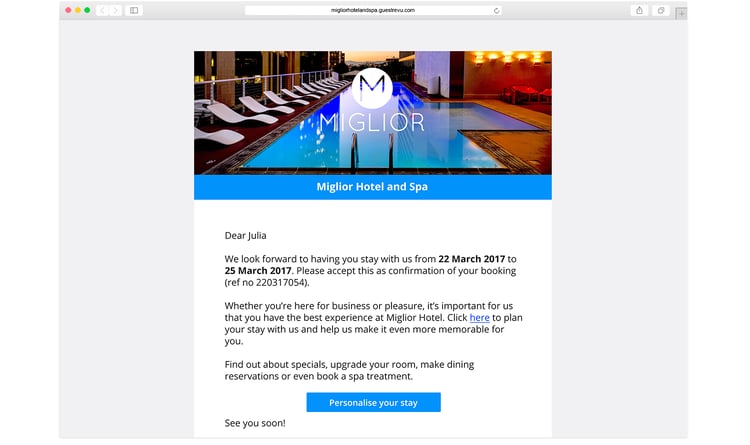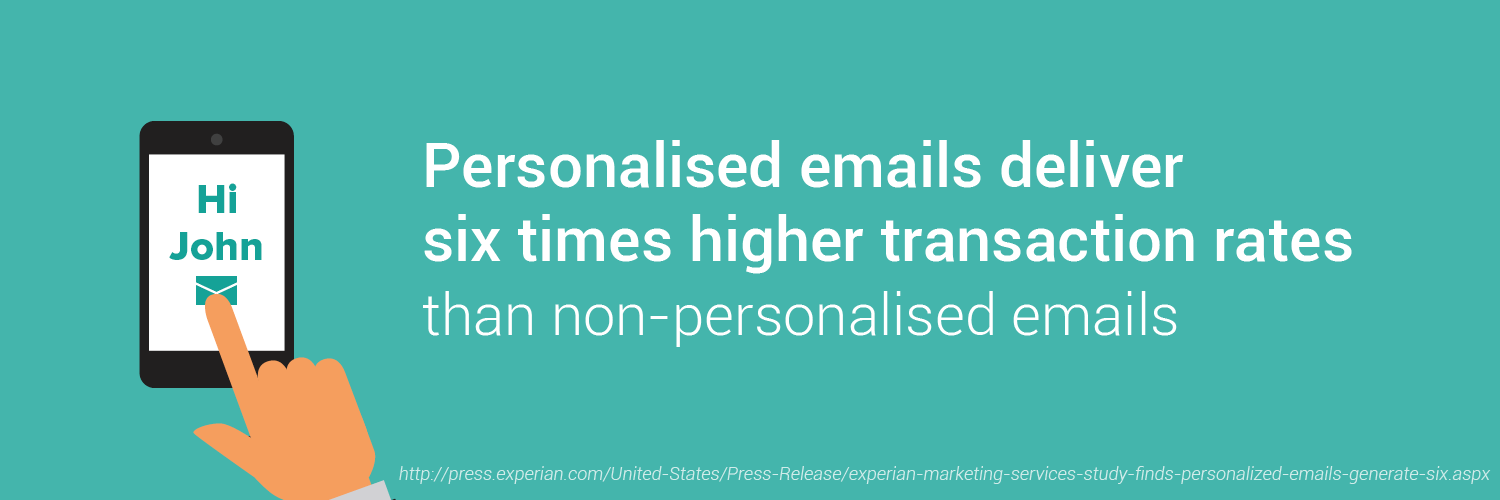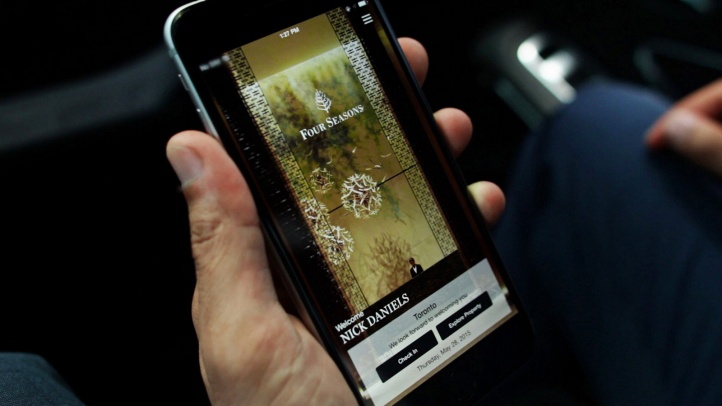In today’s world of easily accessible big data, personalisation (admittedly in variably successful forms) is ubiquitous. People you have never had a conversation with in your life send you marketing emails addressed to you by name, and Facebook wishes you happy birthday, knows what news you will be interested in, and makes videos of you and your friends.

Businesses in all industries are becoming increasingly digital and data-centric, and the push towards personalisation hasn’t passed the hospitality industry by. According to research by Samsung, nine out of 10 hoteliers believe guests will expect their stays to be personalised by 2020, and, if you’re worrying about guests feeling uneasy about the invasiveness of technology, don’t – Software Advice, an online technology reviews firm, discovered that even technology as powerful as facial recognition software would be welcomed by 41% of guests if it was used to personalise their stays.
Your guests expect you to know them before they arrive, they assume that you know what they want and are ready to provide it, and they expect to be treated as individuals – the best (and possibly only) way to do this is with data analytics. The data on your guests is everywhere – in their social media accounts, in their interactions with your website, in their IP addresses, and, if you ask them for it directly in pre- and post-stay surveys.
Many hoteliers have begun to take advantage of the ease with which modern technology allows them to collect and interpret data to enhance efforts at personalisation, so what kinds of tools and resources are available to help hoteliers implement personalisation?
What kinds of technology are available?
1. Tools for basic personalisation
Before you stride confidently out into the world of data capturing, ready to serve guests their favourite dessert of their childhood on the anniversary of their high school graduation, you need to perfect the task of remembering what guests have already told you.
To make personalisation possible, you first need technology that makes it easy to store, retrieve and use guest data collected during the booking process (and previous stays). At the very least, you should know your guest’s name, how to contact them, how many people are in his or her party and what room (or room type) they have booked.
To make personalisation possible, you first need technology that makes it easy to store, retrieve and use guest data
Of course, this kind of data is hardly complex, and you could collect and store it with a piece of paper and a pen. However, as basic as this information is, it is the foundation upon which the rest of your personalisation data will rest, so it is wise to collect it electronically.
Centralised guest data
The vast majority of hotels these days will use some kind of property management system (PMS), which collects this basic data about the hotel guests. Because the data collected in your PMS is the primary data you will build guest profiles upon, it is best to choose a PMS that can be integrated with any other technology you have in place, or might choose to implement in the future.
Guest pre-stay communication

Another basic building block for personalising guest experiences is simply asking guests if there is anything in particular that they want. Pre-stay surveys are an easy way to get started with personalising a guest’s experience – for example, you can ask about bedding, toiletry and minibar preferences or check if guests have dietary restrictions.
2. Tools for better personalisation
If you want to take personalisation seriously, travellers’ experiences with your hotel’s brand in the digital space can and should be personalised long before they decide to book with you.
Personalising prospective guests' digital experience
As soon as a person lands on your hotel’s website, it is possible to track where in the world the session originates from, for example. This allows you to partially “personalise” that visitor’s experience with your brand; you could offer your content in that country’s official language, or show them your prices in the local currency.
While it is possible to do so without one, a sophisticated content management system (CMS) will track information such as location and make it easy for you to alter the content displayed depending on a variety of criteria. These types of CMSs also make it easy for you to use cookies* to ‘remember’ visitors to your website.
Customer Relationship Management (CRM) systems can also help with delivering the right message to the right person at the right time by helping you to segment your contacts, as well as allowing you to find out more about previous guests so that you can further personalise their future visits.
Personalising future visits, sales and marketing
The process of collecting data that can help with personalising guest stays needn’t stop after a guest's first visit. Post-stay questionnaires are a vital part of gathering the information you need to learn not only more about your operations and where your hotel is doing well and where you need to improve, but also more about individual traveller's likes and dislikes.
This information can be used to personalise guests' future stays at your hotel (or at another hotel in your group), as well as to help you to discover what kinds of marketing communication guests might be interested in in the future so that you can send them more targeted offers.

Although we have listed it as a more advanced tool from a personalisation perspective, some kind of guest intelligence system should be part of every hotelier’s basic management arsenal.
3. Tools for over-the-top personalisation
When it comes to personalisation, the line between just right and over-the-top will obviously be dictated by your guests’ likes, dislikes and expectations. However, the sky seems to be the limit when it comes to personalisation technology, especially when you consider the myriad of possibilities provided by the powerful technology in guests' pockets – smartphones.
Some large hotel chains have begun developing custom mobile apps that act as concierges in guests’ smartphones, helping them check in and out, make dinner reservations and plan outings in unfamiliar cities.
 |
| Image (c) The Four Seasons |
Other apps have been developed that allow guests to control “smart rooms” remotely via their smartphones, so that they are in charge of their own personalisation experiences. Such technology can allow guests to customise room elements like lighting, entertainment options and temperature remotely.
What about Human Resources?
Of course, technology can’t do it all alone, and even hotels experimenting with robot concierges still have human staff. Human resources are undoubtedly still needed to manage data analysis and personalisation efforts (for the time being at least), and it is questionable whether it would even be desirable for the majority of hotels to eliminate human interaction.
The human touch, rather than the technology, is probably what most guests will remember about their stays. When used well, technology helps to facilitate the human interaction guests need for their stays to be special, and when technology helps to automate processes, it frees up staff members’ time so that they can attend personally to guests.
The warmth and genuine interpersonal connection of good hospitality will often outweigh a fancy app.
While technology systems can help you gather, store and retrieve valuable data, and make personalisation that much easier, it is also important not to rely too heavily on technology. The warmth and genuine interpersonal connection of good hospitality will often outweigh a fancy app.
What about privacy and safety concerns?
As soon as you begin storing data about individuals, you accept responsibility for the safety of that data. Because of the amount of data now being collected and stored by almost every website people visit, people are becoming more concerned about security and privacy.
Make sure that people are aware of what information you are recording, use the information responsibly (and never sell it to third parties) and make sure you have done everything you reasonably can to keep people’s personal data safe.
Remember that different demographics will take differently to the knowledge that their interactions with you are being recorded, so it might be wise to gauge your guests’ sentiments when it comes to the matter of privacy versus personalisation.
How can a hotel get the most out of personalisation technology?
In every touchpoint that your guest has with your hotel, from the very first time they visit your website to months, or even years, after they have stayed with you, there are opportunities to gather data about that guest and technology to help you do it.
The key to getting the most out of this technology and the separate data points it collects is integration. Making sure that your different technologies are as integrated as possible with one another will allow you to build a rich, consolidated portrait of each guest over time, and allow you to collect and retrieve data in such a way that it is actually useful when it comes to personalising your guest experience.
The key to getting the most out of technology and the separate data points it collects is integration.
Creativity in your use of the data you collect will help you to stand out from the crowd – having tech that automatically addresses a person by name in an email is nifty, but it’s not real personalisation. Technology can’t do personalisation for you, its role is to provide you with the tools and information you need to make sure that your establishment’s natural charm and hospitality is felt by each individual in a way that is meaningful for them.
*While most people take cookies for granted these days, there are laws in some parts of the world that may require you get consent from your website visitors before you use some types of cookies.




